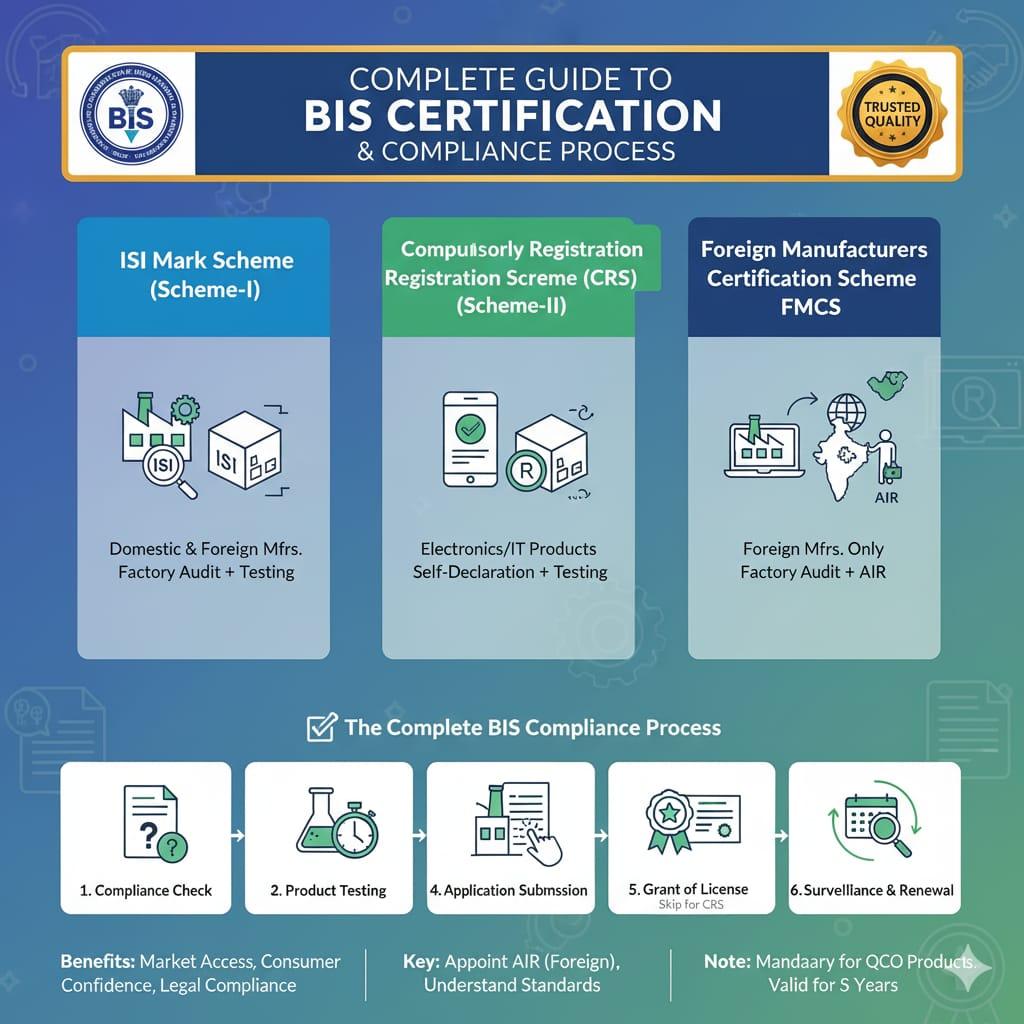Introduction
In India, importing products is not just about logistics and pricing—it also demands strict compliance with national safety and quality standards. One of the most crucial regulatory requirements for importers is obtaining the BIS Certification for Import or the BIS Import Certificate, mandated under the Bureau of Indian Standards (BIS). If your product falls under any Quality Control Order (QCO) or the Compulsory Registration Scheme (CRS), compliance becomes mandatory before customs clearance. This blog provides a detailed, practical, and updated guide to help importers understand why BIS certification is required, which products are covered, the application procedure, documentation, testing needs, timelines, and important considerations for 2025.
What Is BIS Certification for Import?
The BIS Certification for Import is an authorization issued by the Bureau of Indian Standards that confirms that your imported product complies with the required Indian Standard (IS). For many products, especially electronics, steel, chemicals, household appliances, pressure vessels, and construction materials, BIS certification is a legal requirement for entering the Indian market.
Under BIS, two major types of import-related approvals exist:
-
BIS FMCS Certification – For industrial, mechanical, and high-risk products.
-
BIS CRS Registration – For electronics & IT items (such as LEDs, power banks, laptops, adapters, etc.).
Importers often overlook that even if a product is already certified abroad (CE, UL, FCC, ISO), BIS recognition is still mandatory if the product falls under Indian regulation.
Why BIS Import Certificate Is Required
The Indian government enforces BIS certification to:
-
Prevent the import of sub-standard or unsafe products
-
Improve nationwide product safety
-
Protect domestic consumers
-
Strengthen India’s quality ecosystem
-
Encourage fair market competition
-
Reduce product failures, hazards, and counterfeit imports
Without the BIS Import Certificate, customs will hold, reject, or seize the imported consignment, leading to heavy financial loss.
Products That Require BIS Certification for Import
Over 450+ product categories fall under mandatory BIS compliance. Some major product groups include:
Electronics (CRS Registration)
-
LED Lights
-
Power banks
-
Mobile phones & adapters
-
Smart watches
-
Laptops, tablets, UPS/Inverters
-
Speakers, LED TVs
Industrial & Safety Items (FMCS License)
-
Steel products
-
Cement
-
Pressure cookers
-
Chemicals
-
Batteries
-
Electric cables
-
Footwear
Household Goods
-
Water heaters
-
Refrigerators
-
Microwave ovens
-
Toys (mandatory under Toys QCO)
Before importing, it is essential to check whether your product falls under any active QCO or BIS standard.
Types of BIS Certification for Importers
1. BIS CRS Registration (Simpler & Faster)
Applicable for electronic & IT products.
Documents required:
-
Manufacturer details
-
Product test report (from BIS-recognised lab)
-
Technical details
-
Factory documents
2. BIS FMCS Certification (More Complex)
Applicable for industrial, chemical, and safety-critical items.
Includes mandatory:
-
Factory audit
-
Sample testing
-
Detailed documentation
-
Compliance with IS standard
Both certifications require a unique R-number or license number printed on the product.
Step-by-Step Process for BIS Import Certificate
1. Identify the Relevant IS Standard
Each product must comply with its respective Indian Standard (IS). Incorrect standard selection leads to rejection.
2. Obtain Product Testing from BIS-Approved Lab
Testing is mandatory. Only BIS-accredited laboratories are accepted.
3. Prepare Documentation
Typically includes:
-
Business license
-
Product details
-
Quality control documents
-
Manufacturing agreement (if importer is not the manufacturer)
-
Authorization letter
-
Technical specifications
4. Application Submission on BIS Portal
Submit all documents, testing reports, and fees.
5. Factory Audit (FMCS Only)
BIS officers visit the foreign manufacturing site to verify production capability and testing infrastructure.
6. Grant of BIS Import Certificate
Once approved, BIS grants a unique certificate/license.
7. Marking & Labelling Compliance
Every certified imported product must display:
-
BIS Standard Mark
-
License number
-
Batch details
-
IS number
Without this, products cannot be sold in India.
Timelines for BIS Import Certification
-
CRS Registration: 20–30 working days
-
FMCS Certification: 60–120 working days (due to audit and testing)
BIS Import Certificate extend if documents, samples, or testing face discrepancies.
Common Challenges Faced by Importers
Many importers struggle with:
-
Incorrect IS Standard identification
-
Delays in testing
-
Factory audit complications
-
Non-compliant packaging & labeling
-
Missing critical documents
-
Miscommunication with foreign manufacturers
A single mistake can lead to rejection, financial losses, and customs penalties. This is why expert support becomes crucial.
Benefits of BIS Certification for Import
-
Smooth customs clearance
-
Legal compliance
-
Improved market acceptance
-
Enhanced product credibility
-
Safer consumer experience
-
Reduced risk of detention or rejection
Final Thoughts
The BIS Certification for Import and the sunconsultants.co.in process may appear complex, but with proper understanding and expert guidance, achieving compliance becomes much smoother. Whether you are dealing with electronics, machinery, industrial items, or household goods, BIS approval is a necessity—not an option.



